- Home
- Neal Stephenson
The Confusion Page 5
The Confusion Read online
Page 5
"So both Porto Belo and Panama were sacked and destroyed anyway. Despite this—or perhaps because of it—the story of how El Torbellino and I had defended the nunnery created a sensation in Lima and Mexico City, and I was made out to be a great hero—perhaps the only hero of the entire episode, for the performance of those who had been charged with defending Panama was too miserable to be related in polite company.
"I knew nothing of this, for I had fallen gravely ill of my wounds, as well as various tropical maladies picked up on the were-jaguar-hunt which only now were coming into their full flower. I had taken leave of my senses, despite the prodigious bleedings, and volcanic purges, administered every day by doctors who came to the convent during the aftermath of the battles I have described. When next I was aware of my surroundings, I was on a galleon coasting along the Bahía de Campeche, approaching Vera Cruz, which, as even bumpkins such as you may understand, is the sea-port most convenient to Mexico City. I could not open my mouth. A Jesuit doctor explained to me that my jaw-bone had been fractured by the blow of the musket-butt, and that bandages had been wound tightly round my head to clench my jaw shut and hold all in place until the bone knit. In the meantime my left front tooth had been punched out to create a small orifice through which a paste of milk and ground maize was injected, using a sort of bellows, three times a day.
"In due time we threaded the Western Channel of Vera Cruz and dropped anchor under the walls of the castle, there, then waited out a sandstorm, then another, and finally went ashore, forcing our way through fog-banks of gnats, and keeping our pistols at the ready in the event of alligators. We parleyed with the crowd of Negro and Mulatto mule-thieves who make up the citizenry, and arranged for transportation to the City. The town was crowded with shabby wooden houses, all boarded up—it was explained to me that these were the property of white men, who flocked to town when the treasure-fleet was forming up around the Castle, but otherwise retired to haciendas up-country, which were more salubrious in every way. The only part of Vera Cruz that can be called civilized is the square of the churches and the Governor's house, where a company of troops is garrisoned. When the officer in charge there was informed of my arrival, he had his artillery-men fire a salute from their field-pieces, and gladly wrote out a pass for me to travel to the Capital. So we rode out of the landward gate, which had been wedged open by a passing dune, and began our passage west.
"The less said about this journey, the better.
"Mexico City turned out to be everything that Vera Cruz was not in the way of beauty, magnificence, and order. It rises from a lake, joined to the shore by five causeways, each with its own gate. All of the land is owned by the Church and so it is, perforce, a most pious city, in that there is no place to live unless one joins a holy order. There are a score of nunneries and even more monasteries, all of them rich, and besides that a numerous rabble of criollos who sleep in the streets and are forever committing outrages. The Cathedral can only be called stupendous, having a staff of between three and four hundred, headed by an Archbishop who is paid sixty thousand pieces of eight a year. I mention these facts only to convey how impressed I was; had my jaw not been lashed shut by many yards of linen, it would have hung open for a week.
"For several days I was squired around town and fêted by various important men including the Viceroy and his wife: a Duchess of very high birth, who looked like a horse when the lips are pulled back to inspect the teeth. Of course I could not eat any of the fine meals that were set before me, but I learned to drink wine through a hollow reed. Likewise I could not address my hosts, but I could write after-dinner speeches, which I did in the heroic old-fashioned style I'd learned from those family histories. These were very well received.
"Now I am come to the part of my Narration where I must summarize many years' events quickly. I think you know what occurs next: in time the bandage came off my jaw and I was conveyed to the Cathedral where, in a splendid Mass, I was knighted by the Viceroy.
"When the ceremony was finished, the Archbishop came up to give his compliments to me, and to the Viceroy, and to the Viceroy's wife, whom he praised for her chastity and her beauty.
"To which I said as follows: that this was certainly the most wretched piece of brown-nosing I had ever heard, for whenever I laid eyes on the Viceroy's wife I could not decide whether to give her the vigorous butt-fucking she so obviously craved, or to climb on her back and ride her around the zócalo firing pistols in the air.
"The Viceroy clapped me in irons and put me in a bad place for a long time, where I probably should have died.
"Letters made their way down the King's Highway to Vera Cruz and into the holds of galleons, to Havana and finally to Madrid, and other letters returned, and evidently some sort of explanation was proffered, and an arrangement made. After a while I was moved to an apartment where I recovered my health, and then I was conveyed back down to Vera Cruz and given command of a three-masted ship of thirty-two guns, and a fair crew, and told to go out and kill pirates and come ashore as infrequently as possible until I was given other instructions.
"And here I could cite any amount of statistics concerning tonnage of pirate-ships sunk and pieces of eight recovered for the King and the Church, but for me the highest honor was that, among the boca-neers, I became known as the second coming of El Torbellino. I was given the name El Desamparado, which I will now explain to you ignorant filth who know not its meaning. ‘Desamparado' is a holy word to those of us who profess the True Faith, for it is the very last word uttered by Our Lord during His agony on the Holy Rood—"
"What's it mean," asked Jack, "and why'd they paste it on you, who already had such a surfeit of other names?"
"It means, Forsaken by God. For tales of my struggles, and my confinement in the dungeons of Mexico, had preceded me; from which even one such as you, Jack, who has parts missing both fore and aft, may understand why I was called this. Know that whenever I sailed into Havana I was saluted by many guns, though I was never invited to come ashore.
"Then, two years ago, the treasure-fleet was scattered by a hurricane after it had departed Havana. I was sent out into the Straits of Florida to round up stragglers—"
"Wait a moment there, El Desamparado. Is this going to be one of those yarns about how you, but only you, know the whereabouts of some sunken treasure-ship? Because—"
"No, no, it's better than that!" the Spaniard exclaimed. "After combing the sea for many days, we found a smaller vessel—a brig of perhaps seventy-five tons' displacement—trapped among sand-banks in the Muertos Cays, which lie between Cuba and Florida. The storm surge had carried her into a sort of basin whence she could not now escape, for fear of running aground on the shifting sands that encompassed her. We anchored in deeper water nearby and sent out longboats to take soundings. In this manner we discovered an aperture in the sand-bank through which this brig could pass, provided that we waited for high tide, and also offloaded some of her cargo, giving her a shallower draught. The master of this ship was strangely reluctant to follow my advice, but at length I convinced him that this was the only way out. We brought our longboat alongside and set all hands to work lightening the brig's load. And as any seaman will tell you, the quickest way to get weight off a ship is to remove those objects that are heaviest, but least numerous: typically, the armaments. And so, by means of blocks and tackle rigged to the yards, we raised her cannons up out of the gundeck one by one, lowered them into the longboat, and took them out to my ship. In the meantime other sailors busied themselves carrying cannonballs up from belowdecks. And that was how we discovered that this brig was armed, not with lead and iron, but with silver. For the strong places down below, the shot-lockers built to carry cannonballs, were stacked full of pigs."
"Pigs?!" exclaimed several; but here Jack for once was able to make himself useful. "El Desamparado means, not the squealing animals with curly tails, but the irregular bars of silver made by the refinery at the head of a mine by pouring the molten ore out into a
trough of clay." And here Jack was prepared to go on at some length about the silver refineries of the Harz Mountains, which he had once visited, and had explained to him, by the Alchemist Enoch Root. But it seemed that his comrades had already heard many of these details from his own lips, and so he moved on to what he assumed was the point of Jeronimo's story. "Pigs are strictly an intermediate form, meant for one purpose only: to be taken direct to a refining furnace, re-melted, purified, and made into bars, which are assayed and stamped—at which point the King would normally take his rake-off…"
"In New Spain, ten percent for the King and one percent for the overhead, viz. assayers and other such petty officials," Jeronimo put in.
"And so the presence of pigs aboard this ship proved beyond argument that it was in the act of smuggling silver back to Spain."
"For once, the Vagabond has spoken truthfully and to the point," said Jeronimo. "And you will never guess what person we discovered in the best cabin on the ship: the Viceroy's wife, who still remembered me. She was on her way back to Madrid to go shopping."
"What did you say to her?"
"It is better not to remember this. Knowing that she would make a full report of these events to her husband in Mexico City, I did not delay in writing the Viceroy a letter, in which I related these events—but obliquely, in case the letter was intercepted. I assured him that his secret was safe with me, for I was a Caballero, a man of honor, and he could rely upon my discretion; my lips, I told him, were sealed forever."
There was now a long and somewhat agonizing silence there on the roof of the banyolar.
"Some months later, I received a communication from this same Viceroy, inviting me to go to the Governor's House in Vera Cruz on my next visit to that port, to receive a gift that awaited me there."
"A lovely new set of neck-irons?"
"A pistol-ball to adorn the nape of your neck?"
"A ceremonial sword, delivered point-first?"
"I have no idea," said Jeronimo, a bit ruffled, "for I never reached the house of the Gobernador. It is important to mention that our purpose in visiting Vera Cruz was to pick up a shipment of small arms from a merchant I had come to know there—a fellow who had a knack for taking delivery of the King's armaments before they reached the King's soldiers. Several of my men and I accomplished this errand first, in a couple of hired wagons, and then we told the teamsters to take us to the Governor's House via the most direct route, for we were running late even by the standards of New Spain. I was in my finest clothes.
"We entered the central plaza of Vera Cruz from a direction that they did not expect, for instead of proceeding up the main street with its boarded-up houses, we had come in from the depot of the arms merchant, which lay on the other side of the town. Our first hint that something was amiss came from the countless fine tendrils of smoke spiraling up from various places of concealment around the town square—"
"Matchlocks!" Jack said.
"Of course our pistols were already loaded and at the ready, for this was Vera Cruz. But this gave us warning to break out the muskets and to knock the lids from several cases of granadoes. The matchlock-men opened fire on us, but raggedly. We charged them with cutlasses drawn, intending to kill them before they could reload. Which we did—but we were astonished to discover that these were Spanish soldiers of the local garrison! At this point fire came down on us from all around: the windows of the Governor's House and of the churches and monasteries ringing the square all served as loop-holes for this emboscada."
"The soldiers had occupied all of those buildings?" exclaimed Mr. Foot, whose capacity for indignation knew no limits.
"So we assumed at first; but when we returned fire, and flung our granadoes, the burnt and dismembered bodies that sprayed out of those windows were those of monks and mid-level government officials. And yet still we were stupid, for our next mistake was to drive the wagons forward, out of the square, and into the main street of the town. Whereupon planks began to fall away from the windows and doors of the sorry wooden houses that the Viceroy's officials had put up there, and the true battle began. For it was here on this street where they had planned to make the ambush. We overturned both of the wagons, and made a fortification out of them; we shot all of the horses and piled their corpses up as ramparts; we fought from doorway to doorway; we got a runner out to my ship, and she opened fire upon the town with her guns. In return she came under fire from the cannons of the castle. We never would have survived against such a force, except that the guns set some of those buildings afire, and a wind blew the flames down the street as if those rows of wooden buildings had been trails of gunpowder. Many bodies fell in the dust of Vera Cruz on that day. Most of the town burned. My ship sank before my eyes. I escaped from the town with two of my men, and we made our way down the coast as best we could. One of my men was killed by an alligator, and one died of a fever. At length I came to a little port where I bought passage to Jamaica, that den of English thieves, now the only place in the Caribbean where I could hope to find sanctuary. There, I learned that in the weeks following the catastrophe, what remained of Vera Cruz had been taken and sacked by the pirate Lorenuillo de Petiguavas, and utterly leveled with the ground, so that it would have to be built again from nothing.
"As for myself, I tried to make my way back to Spain so that I could return to the place of my birth in Estremaduras. But when Gibraltar was almost in sight, my ship was captured by the Barbary Corsairs, et cetera, et cetera, et cetera."
"It is a ripping yarn," Jack conceded, after a few moments' silence, "but the best story in the world does not amount to a Plan."
"That is my concern," said Moseh de la Cruz, "and I have a Plan that is nearly complete. Though it has one or two leaks in it, which you might be able to plug."
The Commerce of the World, especially as it is now carried on, is an unbounded Ocean of Business; Trackless and unknown, like the Seas it is managed upon; the Merchant is no more to be follow'd in his Adventures, than a Maze or Labyrinth is to be trac'd out without a Clue.
—DANIEL DEFOE, A Plan of the English Commerce
6 SEPTEMBER 1689
To Eliza, Countess de la Zeur
From Sgt. Bob Shaftoe
Dundalk, Ireland
6 September 1689
My lady,
I am speaking these words to a Presbyterian scrivener who followed our regiments down from our points of disembarkation around Belfast, and has hung out his shingle on a hut near Dundalk camp. From this, you may draw what conclusions you will concerning which matters I will address straightforwardly, and which I will speak not of.
A queue of soldiers begins at my left shoulder and extends out the door and down the lane. I rank most of them, and so could keep the scribbler busy all day if I chose, but I will address important matters first and try to conclude our business directly so that the others may send greetings to their mums and mistresses in England.
Your letter of June 15th reached me just before we embarked for Belfast, and was read to me aboard ship by a chaplain. It is well that I made your acquaintance and took your measure in the Hague, or I would have dismissed its contents as idle and womanish chatter. Your stylings are finer than the discourse that one is accustomed to hearing aboard a troop-ship. All the blokes who overheard it were gobsmacked that such pretty phrases had been directed to one such as me. I am now reputed to be a man of parts, and a fellow with many high and mighty connexions.
Upon listening to certain phrases for the third and fourth time, I collected that you had run afoul of a French count by the name of d'Avaux, who had obtained some knowledge of you that put you in his power. The Revolution in London had caused this d'Avaux to be recalled suddenly to France. Later the unfortunate Count was despatched to Brest, the remotest port of France, and loaded aboard ship in company of none other than Mr. James Stuart, who was formerly known as James II by the Grace of God of England, etc., King.
Off they sailed to the sophisticated metropolis of Bantry, Ireland
. Later you had news that they had assembled an army of Frenchmen, Irish Catholics, and Jacobites (as we now refer to James's supporters in Merry England) and established themselves in Dublin.
You are too courtly, my lady, ever to come out and say what you mean directly, and so the exact meaning of your letter was unclear to me and is unclear still. As I was situated in London, and your letter was addressed thither, you cannot have known that I'd have it read to me during a passage to Ireland. Or perhaps you are so clever and well-informed that you anticipated this. Surely it could never have been a request for my help? For how could I give you any aid in such a matter?
Brother Jack begat two sons by a strapping Irish lass named Mary Dolores Partry—he must have told you. She died. The boys have been raised by the kin of their late mum. I have made efforts to know them and to tender such support as I might—for example, by recruiting a few of their uncles and cousins into our Regiment. My life as a soldier has made me a poor uncle indeed. But the boys, who have inherited their dad's weakness to impulses of a perverse kind, and who have been raised by Irishmen to boot, seem to respect me all the more, the more I neglect them.

 Zodiac: The Eco-Thriller
Zodiac: The Eco-Thriller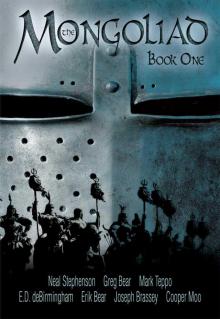 The Mongoliad: Book One
The Mongoliad: Book One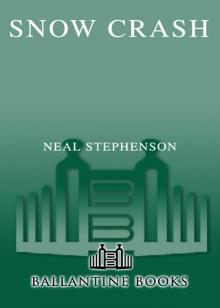 Snow Crash
Snow Crash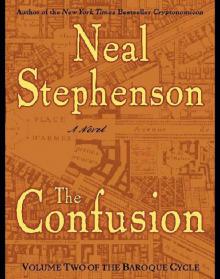 The Confusion: Volume Two of the Baroque Cycle
The Confusion: Volume Two of the Baroque Cycle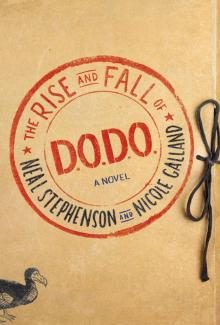 The Rise and Fall of D.O.D.O.
The Rise and Fall of D.O.D.O.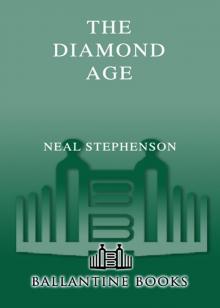 The Diamond Age: Or, a Young Lady's Illustrated Primer
The Diamond Age: Or, a Young Lady's Illustrated Primer The Big U
The Big U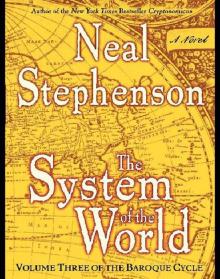 The System of the World: Volume Three of the Baroque Cycle
The System of the World: Volume Three of the Baroque Cycle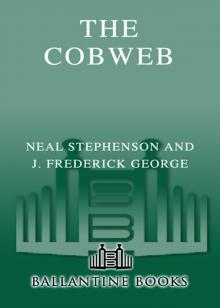 The Cobweb
The Cobweb Reamde
Reamde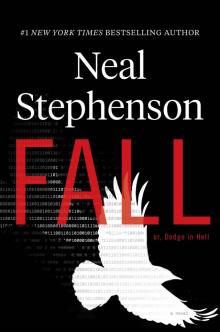 Fall; or, Dodge in Hell
Fall; or, Dodge in Hell Interface
Interface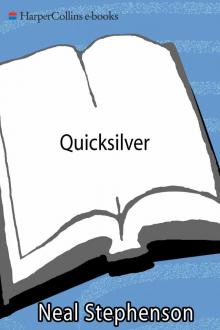 Quicksilver
Quicksilver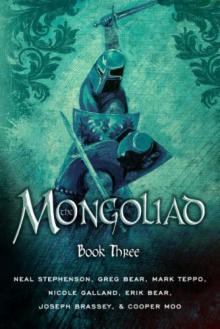 The Mongoliad: Book Three
The Mongoliad: Book Three Seveneves
Seveneves Atmosphæra Incognita
Atmosphæra Incognita In the Beginning...Was the Command Line
In the Beginning...Was the Command Line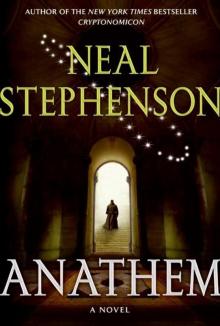 Anathem
Anathem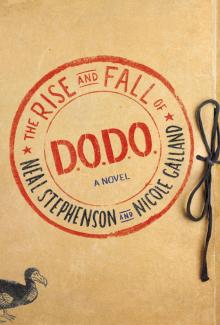 The Rise and Fall of D.O.D.O.: A Novel
The Rise and Fall of D.O.D.O.: A Novel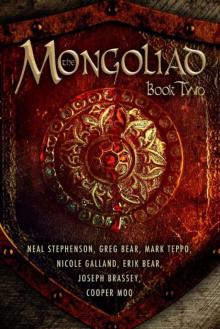 The Mongoliad: Book Two
The Mongoliad: Book Two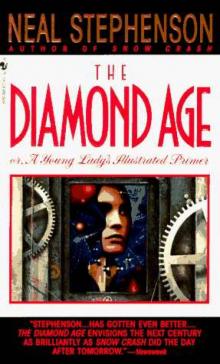 Diamond Age or a Young Lady's Illustrated Primer
Diamond Age or a Young Lady's Illustrated Primer THE System OF THE WORLD
THE System OF THE WORLD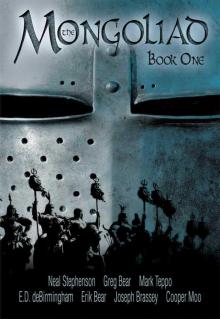 The Mongoliad: Book One tfs-1
The Mongoliad: Book One tfs-1 Some Remarks: Essays and Other Writing
Some Remarks: Essays and Other Writing Zodiac
Zodiac Spew
Spew The Baroque Cycle: Quicksilver, the Confusion, and the System of the World
The Baroque Cycle: Quicksilver, the Confusion, and the System of the World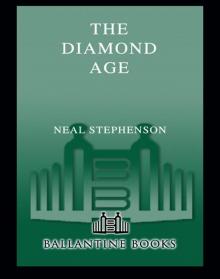 The Diamond Age
The Diamond Age Reamde: A Novel
Reamde: A Novel In the Kingdom of Mao Bell
In the Kingdom of Mao Bell Mother Earth Mother Board
Mother Earth Mother Board Twelve Tomorrows - Visionary stories of the near future inspired by today's technologies
Twelve Tomorrows - Visionary stories of the near future inspired by today's technologies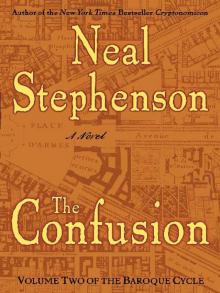 The Confusion
The Confusion The Great Simoleon Caper
The Great Simoleon Caper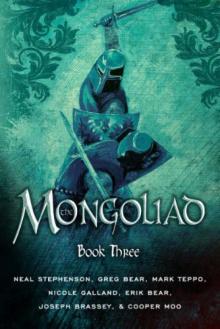 The Mongoliad: Book Three tfs-3
The Mongoliad: Book Three tfs-3